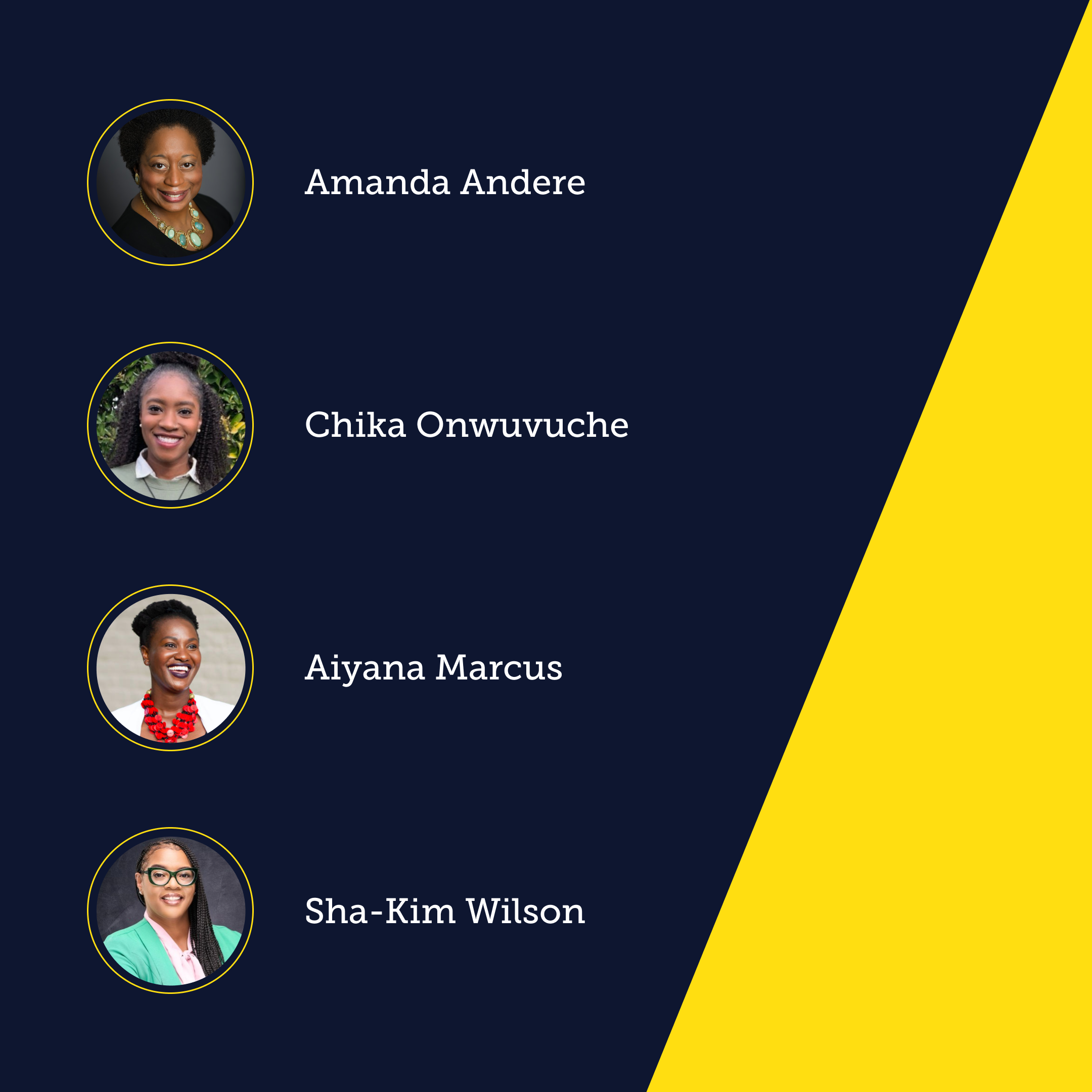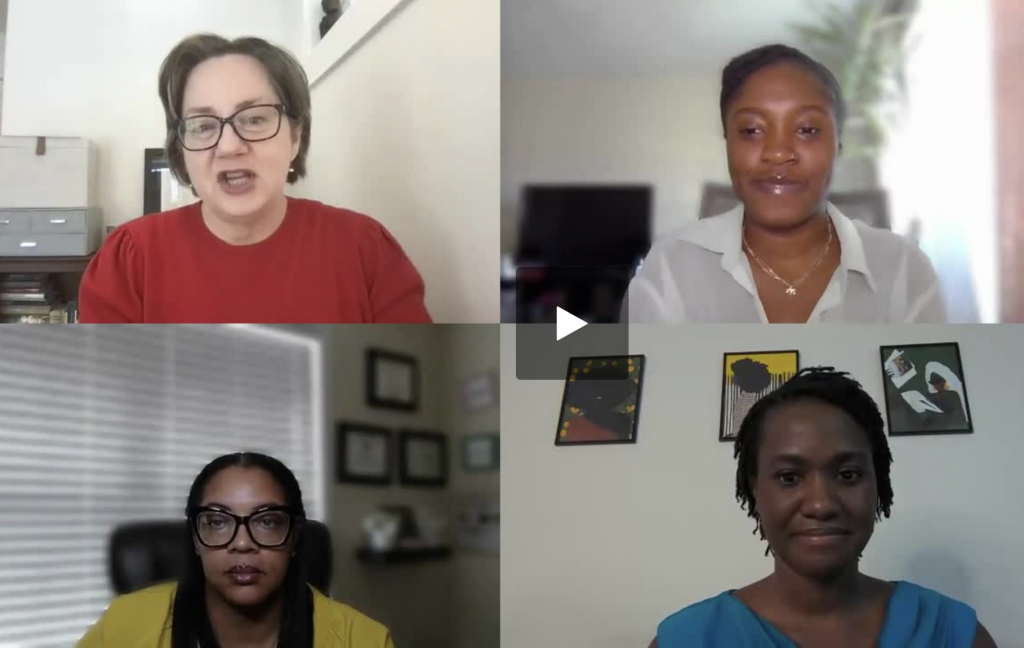From leading major foundations and corporate giving programs to working on the front lines of social service organizations and community-based groups, Black, Indigenous, and people of color (BIPOC) women in philanthropy are making an invaluable impact. Yet, BIPOC women in philanthropy often shoulder a huge burden at the cost of their own well-being.
How intentional are foundations in supporting women and BIPOC women in philanthropy? Internal foundation staff strategies, external grantmaking, and community building are strengthened by putting well-being first. Our Program Officer, Chika Onwuvuche, joined a candid discussion with BIPOC women in philanthropy on how to start, elevate, and broaden support for roles and voices for women of color in philanthropic work. The conversation was led by Sha-Kim Wilson, Senior Director of Strategic Partnerships at the Tides Foundation. It was hosted by Catchafire—an organization facilitating connections between grantmakers and corporations seeking to equip nonprofits with capacity-building resources and professionals who want to donate their time and talent through virtual volunteering with nonprofits who need their skills.
Other guest speakers included:
- Amanda Andere, CEO, Funders Together to End Homelessness
- Aiyana Marcus, Senior Program Manager, Charlottesville Area Community Foundation
What does wellness look like?
BIPOC women in philanthropy have long been underrepresented and overlooked. As the sector strives to become more diverse and inclusive, it is critical to recognize the importance of creating wellness for BIPOC women in philanthropy. BIPOC women in philanthropy are on the frontlines of complex and challenging community issues that require a consistent pull on their physical and emotional well-being. Just like their leadership requires their active presence, their rest is just as important and requires active support. For these women, wellness involves creating a safe space for dialogue, collaboration, and advocacy. This means having access to resources and support to help them achieve their goals. It also involves having equitable representation in leadership and decision-making roles.
Holistic wellness looks different for everyone. It’s essential to define what it means to you—and to make space for it in your daily life. Developing a culture of well-being is also a generational issue; often, philanthropic leaders feel guilty for taking rest and taking time to put themselves first. Many are accustomed to doing everything at once and running on fumes.
For Chika, wellness means:
Chika: It’s about institutions creating conditions for wellness and us listening internally to our bodies. It’s about modeling wellness to folks around me so we can create a cultural shift around rest. How do you create a space where others can talk? It shouldn’t be rest to fill someone else’s cup; it’s because I need to breathe, eat, and do things that are a necessity in life for me to engage in joy. Model and create those spaces for those around you to be vulnerable and share in that space. What are things I’m doing to contribute? I need to listen to what my body and soul need. Find what wellness is for you.
What can philanthropy do to create a culture shift around well-being?
The importance of investing in BIPOC women in philanthropy is undeniable. The mental and physical well-being of BIPOC women in philanthropy is closely connected to the success of nonprofits and their communities.
What should philanthropy be doing differently for the next generation? What does a sector shift toward wellness look like?
Chika: We know that young people are not prioritized in decision-making happening around their lives. Girls have higher rates of anxiety, depression, or almost anything; you name it. We’re so advanced technologically, yet we can’t resolve wellness. There’s a lot philanthropy can and should be doing to fund young people to make decisions for their health.
There shouldn’t be a fight for trying to center young people in places like healing circles where they can talk about their feelings. There’s a lot of talk around resources for young people, a social worker here or there, but that is rooted in capitalism. There’s medical insurance people have to navigate. They have to go through the welfare system/parents/guardians, creating many barriers to even access that. There aren’t enough of us, Black women, in that space to provide coverage.
We need a larger community-centered approach in problem-solving: how do we fund and uplift more healing circles and spaces for young people to gather? How do we ensure mental health and wellness are included in the curriculum so young people can learn about their bodies? We know these things exist, but we have to fund them. Having conversations is a great first step. There are resources out there, but we have to put that into the hands of young people well-equipped to address wellness.
There needs to be a cultural shift in how we think about work. As adults, we have ideas on what it takes to be a successful person; young people are showing me that version of success doesn’t align with them.
Chika believes shifting the narrative of work starts with:
- Instituting four-day workweeks
- Generous time off so people can focus on their personal lives
- Increasing paid and maternity leave
With the use of social media and technology, young people are pivoting. Social media is one of the ways Black girls congregate—so how do we engage people in a less harmful way to be able to communicate and engage with folks from all over in how they practice wellness?
In addition to a cultural shift, what can philanthropic organizations include in their wellness policies to take care of their teams?
Chika: Extended time off. I believe in the ability to step away. What does it look like to support folks across the spectrum to do what they like? We have these confines of time, but the energy I’m giving this week is not the same as the energy I’m giving next week. How can we respond to our bodies?
One key part of a culture and policy shift is the importance of modeling. The more individuals and organizations develop a culture of well-being, the more it will be normalized in the sector as a whole:
Chika: We need to see it be modeled from leadership. If your leader can model the well-being practices that you want to see, you’re more likely to engage in the same type of behavior. I was lucky to work in a place where each month, we’d get additional leave time. These are internal policies that can be changed more easily. Be liberal with the way you give that time off.
About The Speakers
Amanda Andere, CEO, Funders Together to End Homelessness
Amanda has spent over 15 years working in the nonprofit & public sector as a leader committed to racial and housing justice. She served as CEO of Wider Opportunities for Women, a national advocacy org. She’s a board member of the United Philanthropy Forum and Equity in the Center and also serves on the Leadership Council for the DC Partnership to End Homelessness. As a former Co-Chair of A Way Home America, Amanda is a co-conspirator in their work to end youth and young adult homelessness.
Aiyana Marcus, Senior Program Manager for the Charlottesville Area Community Foundation
Aiyana manages the development, implementation, and evaluation of grant programs along with other resource deployment strategies that support an ecosystem of trust-based, equitable philanthropy. She is also a community-focused artist with 20 years of experience promoting the authentic storytelling of Black lives, including writing, directing, and producing four of her original plays. Most recently, She Echoes on the Vine premiered at the Jefferson School African American Heritage Center in 2021.
Chika Onwuvuche, Program Officer, Washington Area Women’s Foundation
Born and raised in Washington, DC, Chika is committed to ensuring area residents are afforded equitable resources and services to live self-determined productive lives. She is a champion of youth-led initiatives that empower for systems change and manages the foundation’s youth and safety grant portfolios with support for advocacy efforts of collaborative grantee partners. Chika has a bachelor’s in poli-sci and social work from UW-Madison & an MS in social work from UPenn.
Sha-Kim Wilson, Senior Director, Strategic Partnerships, Tides Foundation
With over 20 years of experience as a sales executive, Sha-Kim has built her career being a client advocate and trusted advisor for midsize to large organizations across the globe. She is the founder of Helen’s Hands, a nonprofit organization that advocates for Alzheimer’s caregivers. Sha-Kim received her undergraduate degree from Florida International University, MBA from University of Phoenix, and is currently pursuing her PhD in Organizational Leadership.
***
Stay up to date
For more information about events like these, subscribe to our newsletter and follow us on social media.




